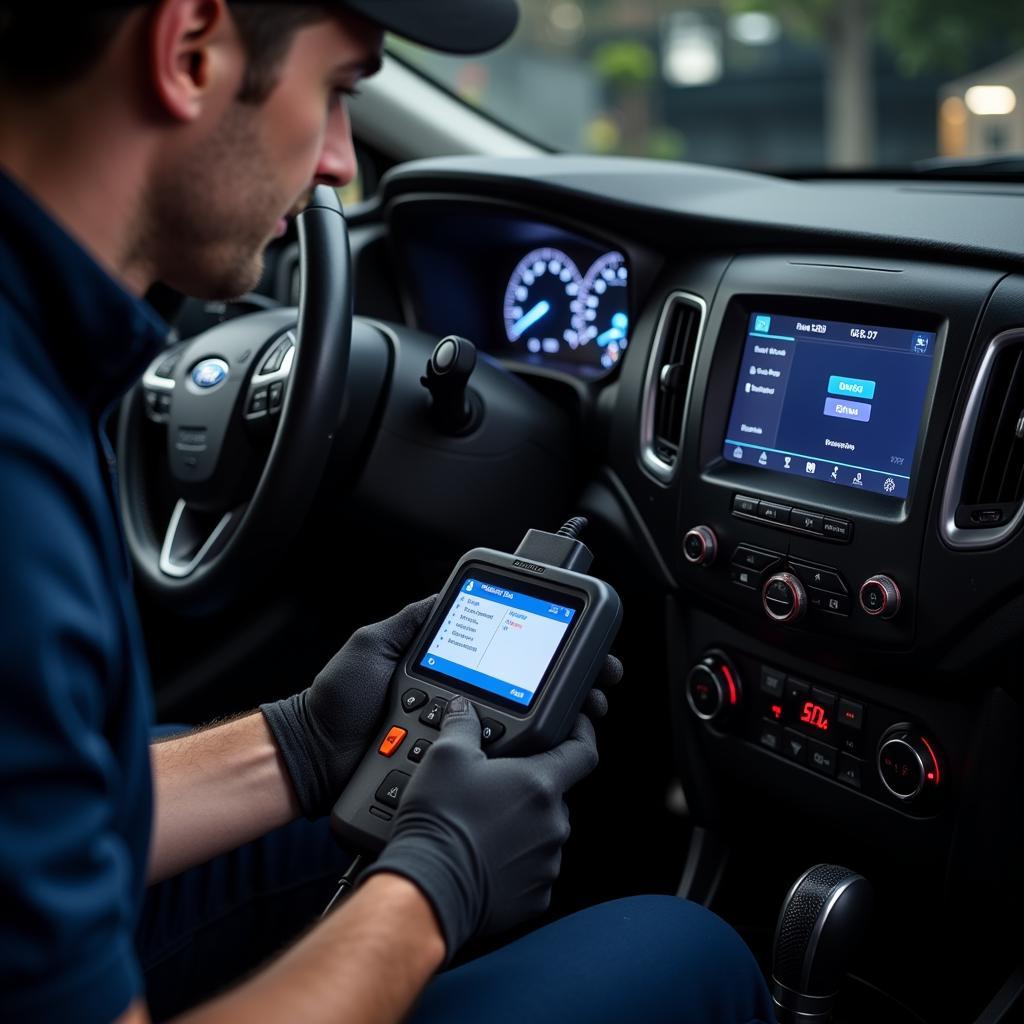Owning a Ford car is great, until that dreaded check engine light pops up on your dashboard. Suddenly, you’re faced with the mystery of what’s wrong and the potential cost of repairs. This is where diagnostic tests for Ford cars come in. These tests can quickly pinpoint the issue, saving you time, money, and unnecessary stress.
Understanding Diagnostic Tests for Your Ford
Diagnostic tests for Ford vehicles are essentially in-depth scans of your car’s computer system. They read the Diagnostic Trouble Codes (DTCs) stored in your car’s computer, which are triggered when a component or system isn’t working as it should.
 Ford Car Diagnostic Test
Ford Car Diagnostic Test
Common Types of Diagnostic Tests for Ford Cars
There are various types of diagnostic tests that mechanics use to diagnose problems in Ford cars. Here are some of the most common:
1. OBD-II Scan: This is the most basic type of diagnostic test, using the standardized On-Board Diagnostics (OBD-II) port found in all cars manufactured after 1996. An OBD-II scanner can read and clear basic DTCs, providing information about engine performance, emissions, and other vital systems.
2. Comprehensive Diagnostic Scan: For a more in-depth analysis, a comprehensive diagnostic scan goes beyond the basic OBD-II scan. It utilizes advanced scan tools and software designed specifically for Ford vehicles. This test can access and analyze data from various modules, including engine, transmission, airbags, ABS, and more.
3. Manufacturer-Specific Diagnostic Tests: Ford has its own suite of specialized diagnostic tests designed for specific models and systems. These tests often require proprietary software and equipment found at Ford dealerships or specialized repair shops.
Why Diagnostic Tests for Your Ford Car Are Important
Ignoring warning lights or strange noises coming from your Ford is never a good idea. Here’s why you should take your car for a diagnostic test at the first sign of trouble:
- Early Detection: Identifying issues early can prevent minor problems from escalating into major (and expensive) repairs down the line.
- Accurate Diagnosis: Guesswork can be costly. Diagnostic tests provide accurate information about the root cause of the problem, ensuring the right repairs are made.
- Cost Savings: By accurately identifying the issue, you can avoid unnecessary repairs and save money on parts and labor.
- Safety: Some car problems can compromise your safety on the road. Diagnostic tests can identify these issues and ensure your car is safe to drive.
When to Get a Diagnostic Test for Your Ford Car
While the check engine light is a clear indicator that your car needs a diagnostic test, there are other signs to watch out for:
- Unusual noises coming from the engine or other parts of the car
- Warning lights on the dashboard, such as the ABS or airbag light
- Changes in your car’s performance, like reduced fuel efficiency or difficulty starting
- Rough idling or stalling
Finding Reliable Diagnostic Tests Near You
Finding a reliable mechanic to perform diagnostic tests on your Ford car is essential. Here are a few tips:
- Ask for Recommendations: Ask friends, family, or online communities for recommendations for trustworthy mechanics specializing in Ford vehicles.
- Check Online Reviews: Websites and apps like Yelp, Google Reviews, and Angie’s List can provide valuable insights from other Ford owners.
- Look for Certifications: ASE-certified technicians have undergone rigorous training and testing, demonstrating their competence in automotive repair.
- Consider Dealerships vs. Independent Shops: Ford dealerships have specialized knowledge and access to the latest software and equipment. However, independent shops can often offer more competitive pricing.
Conclusion
Diagnostic tests are crucial for maintaining your Ford car’s health, performance, and safety. When those warning lights start flashing, don’t ignore them. Take your car to a trusted mechanic specializing in Ford vehicles and let them run a diagnostic test. It’s an investment that can save you money and headaches in the long run.
FAQs about Diagnostic Tests for Ford Cars
1. How much does a diagnostic test for a Ford cost?
The cost of a diagnostic test can vary depending on your location, the mechanic you choose (dealership vs. independent shop), and the complexity of the issue. Basic OBD-II scans can range from $50 to $100, while comprehensive diagnostic tests can cost between $100 and $200 or more.
2. Can I do a diagnostic test on my Ford myself?
Yes, you can purchase an OBD-II scanner and perform basic diagnostic tests yourself. However, keep in mind that these scanners may not provide the same level of detail as professional-grade equipment.
3. Will a diagnostic test tell me everything that’s wrong with my car?
While diagnostic tests are very helpful, they are not foolproof. They can pinpoint the source of the problem based on the DTCs stored in the computer, but further inspection by a qualified mechanic may be necessary to determine the full extent of the issue.
4. What is a DTC code?
DTC stands for Diagnostic Trouble Code. These are standardized codes stored in your car’s computer that indicate a specific malfunction or issue.
5. Can I still drive my Ford if the check engine light is on?
It’s generally not advisable to ignore the check engine light. While some issues may be minor, others could indicate a serious problem that could put you and your passengers at risk.
6. How often should I get a diagnostic test for my Ford?
It’s a good idea to have your Ford car inspected annually, even if you haven’t noticed any issues.
7. What happens after a diagnostic test?
Once the diagnostic test is complete, the mechanic will discuss the results with you and recommend the necessary repairs.
Still Have Questions About Your Ford?
Check out our other informative articles:
Need expert help with your Ford’s diagnostics? Contact us via WhatsApp: +1(641)206-8880 or email us at: [email protected]. Our dedicated team is available 24/7 to assist you.

Leave a Reply